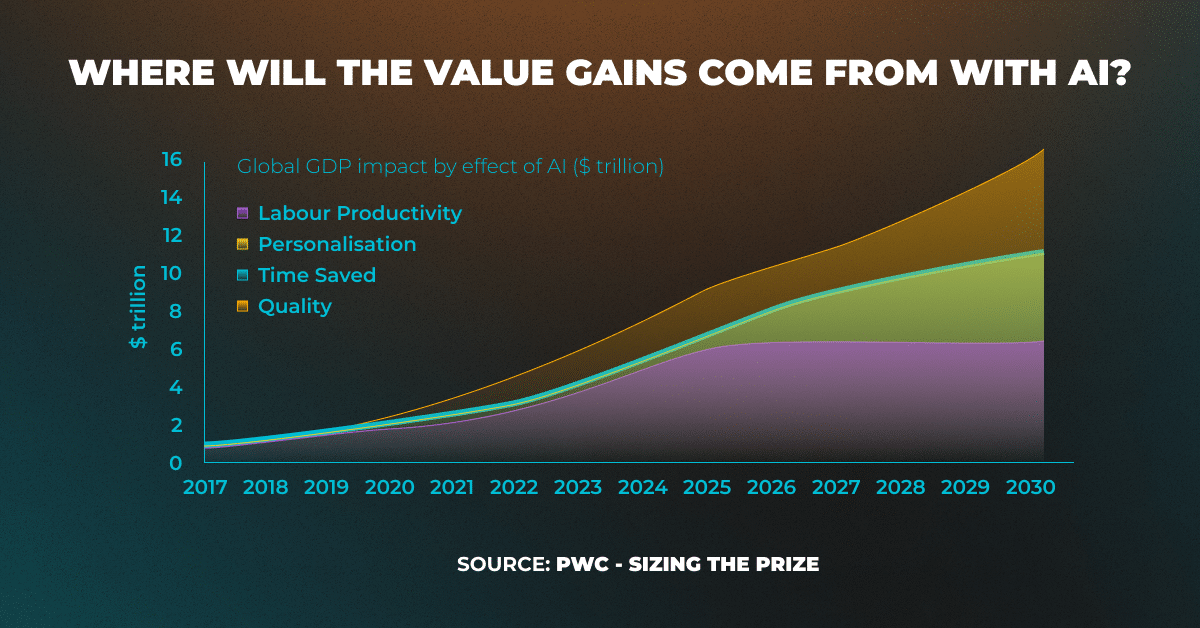The Power of AI for SMEs: Opportunities and Responsibilities
Welcome, innovators of small and medium-sized enterprises (SMEs), to the frontier of technological advancement where Artificial Intelligence (AI) isn’t just a tool but a game-changer. Today, as we embark on the journey into the realm of AI, it’s not about merely adapting to change; it’s about SMEs becoming the architects of the AI landscape, shaping the future. The potential impact of AI on SMEs is colossal, with the Artificial Intelligence In Small & Medium Business market estimated to soar to $90.68 Billion by 2027.

AI: Your Growth Catalyst
In this era of rapid evolution, AI, particularly Machine Learning, has emerged as the driving force propelling SMEs toward unparalleled growth. Picture this: enhanced operational efficiency, predictive capabilities that foresee machine failures, reduced downtime, and the automation of mundane tasks, all resulting in skyrocketing productivity. From revolutionizing e-commerce to transforming healthcare and insurance, AI empowers SMEs to deliver exceptional customer service, streamline operations, and spearhead market growth. As SMEs navigate this transformative landscape, it’s crucial to recognize and seize AI’s potential benefits.
AI: Fueling Growth and Innovation
Boosting Efficiency: Imagine supercharging your operational efficiency without breaking the bank. AI-powered solutions are your secret weapon, especially when rapid growth is on the horizon.
Marketing Powerhouse: Turn AI into your marketing powerhouse. From building brand awareness to understanding customer behavior, AI-driven marketing isn’t just cost-effective; it’s a strategic tool for increased sales and business growth.
Customer Service Excellence: Elevate your customer service game with AI-powered chatbots. It’s not just about meeting the demand for quicker support; it’s about creating customer satisfaction and loyalty.
Cost-Effectiveness: AI streamlines your operations and minimizes costs, acting as your virtual assistant. Whether you’re in manufacturing, healthcare, or e-commerce, AI can automate repetitive tasks, cutting down on manual labor and associated expenses.

The most significant potential economic uplift from AI will likely come from improved productivity in the near term. This includes automating routine tasks, augmenting employees’ capabilities, and freeing them up to focus on more stimulating and higher value-adding work. The impact on productivity could be competitively transformative – businesses that fail to adapt and adopt could quickly find themselves undercut on turnaround times and costs. As a result, they stand to lose a significant amount of their market share. However, the potential of this initial phase of AI application mainly centers on enhancing what’s already being done rather than creating too much that’s new.
AI: Navigating Ethical Challenges
As small and medium-sized enterprises (SMEs) venture into AI adoption, they encounter many ethical challenges that require meticulous attention. From apprehensions about data privacy to navigating algorithmic biases, the moral terrain linked to AI is intricate and ever-evolving.
In this examination, we probe a fundamental question: How can your SME effectively address the ethical challenges woven into AI adoption? Unraveling this query proves indispensable for SMEs seeking to leverage the revolutionary capabilities of AI while upholding a commitment to responsible practices, placing ethical considerations at the forefront of technological progress. Therefore, in the swiftly evolving landscape of AI, which outpaces the regulations, SMEs should take proactive actions over possible ethical challenges:
- Data privacy and security: AI-based language models trained on data sets that sometimes include personally identifiable information about individuals. This data can sometimes be elicited with a simple text prompt. Ensure the anonymization of sensitive information and stay proactively informed about evolving regulations.
- Safeguarding intellectual property: AI tools are trained on massive image and text databases from multiple sources, and the data source could be unknown. Protect its IP and prevent the inadvertent breach of third-party copyright using pre-trained foundation models.
- The opacity of AI algorithms: AI systems group facts together probabilistically and consume tremendous volumes of data that could be inadequately governed, and of questionable origin. Provide clear explanations for decision-making and establish accountability for the outcomes.
- Discrimination in communication: AI-generated content sent on behalf of the company, for example, could inadvertently contain offensive language or issue harmful guidance to employees. Exclude humans to meet ethical expectations and brand values.
AI has the potential to reshape industries by introducing new services and business models. The ongoing digitization wave has already demonstrated a significant transformation, and AI’s eruption could lead to new market leaders’ emergence. Today’s prominent companies might face challenges sustaining relevance if their response to AI needs to be revised.
AI: Key questions for SMEs
Future market leaders are likely shaping their strategies now. To stay competitive and seize opportunities, your business should address critical questions:
- Assess Vulnerability: How susceptible is your business model to AI disruption, and when can these changes be expected?
- Identify Openings: Are there transformative opportunities in your market, and how can you capitalize on them?
- Evaluate Resources: Do you possess the necessary talent, data, and technology to comprehend and leverage AI opportunities? Consider the value IT staff augmentation services can bring in providing the right expertise.
- Prioritize Trust: How can you integrate trust and transparency into your AI platforms and applications?
Getting these aspects right can empower creativity, collaboration, and decision-making within your organization. It offers the potential to understand customer behavior, predict individual needs, and respond with unprecedented precision and foresight.
As a business leader, it’s essential to reflect on these questions, considering the dynamic landscape of AI. The ability to adapt and innovate, coupled with strategic IT staff augmentation, will play a pivotal role in navigating the transformative power of AI.





